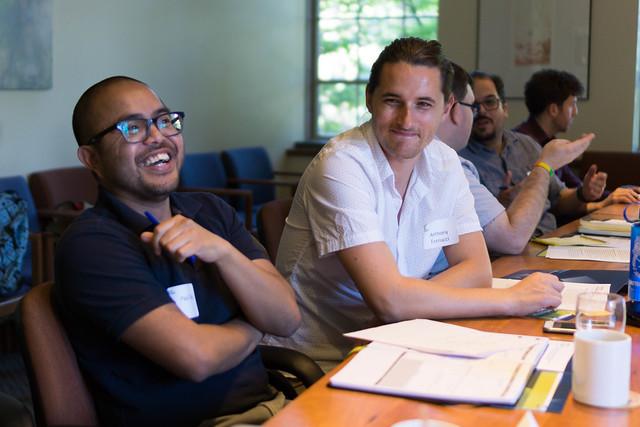
Catalyzing Collaboration situates collaboration at the center of our work in the humanities, creating intellectual partnerships on small and large scales--among graduate students, between graduate students and faculty, and between two- and four-year institutions.
The Simpson Center for the Humanities announces a new two-year program—Reimagining the Humanities PhD and Reaching New Publics: Catalyzing Collaboration—starting in September 2019, thanks to a generous $650,000 grant from The Andrew W. Mellon Foundation. The program, which builds on the work of a prior grant award from The Mellon Foundation, will continue to pursue change in doctoral education in the humanities with the goal of reaching beyond academic professional spheres to new publics. The program will also emphasize collaboration as a cross-institutional educational good and a scholarly and pedagogical practice that is transferable to other sectors.
Three departments key to the humanities will be involved—English, History, and Philosophy—and the program will offer support for joint fellowships and collaborative projects across all components of the program instead of single awards to individuals. The program extends our current partnership with North Seattle College, South Seattle College, and Seattle Central College.
“The opportunity that this program offers graduate students to immerse themselves in an educational ecosystem as spectators and participants promises to provide new and valuable insights into the relationship between two- and four-year institutions,” says English Professor Juliet Shields. “Furthermore, Catalyzing Collaboration situates collaboration at the center of our work in the humanities, creating intellectual partnerships on small and large scales--among graduate students, between graduate students and faculty, and between two- and four-year institutions.”
Joint fellowships will support doctoral students to shadow two-year college faculty in their disciplines and will culminate in a week-long pedagogy institute, where two-year college faculty, UW faculty, and doctoral students will co-design courses that resonate at both of their institutions. Summer fellowships will also support doctoral students to undertake public-facing projects with strong collaborative dimensions, as well as UW faculty to collaborate on designing graduate seminars with significant public components or public-facing projects.
Jennifer Smith, a Mellon Fellow and doctoral student in History, says of her experience: “Taking part in the Reimagining the Humanities PhD program through the Simpson Center allowed me to develop a better understanding of the variety of career pathways available with a PhD that aren’t dependent upon a professorship at an R1 University like UW, but that can be equally as valuable and rewarding.”
The conviction that animates Reimagining the Humanities PhD and Reaching New Publics: Catalyzing Collaboration is that doctoral education, especially at a public university, must be guided by a capacious vision of its fundamental purpose: to contribute to the public good. This program will prepare UW doctoral students in the humanities for this task by meaningfully connecting them to diverse, access-oriented, and teaching-intensive institutions of higher education, and by preparing them to undertake collaborative and community-engaged scholarship.